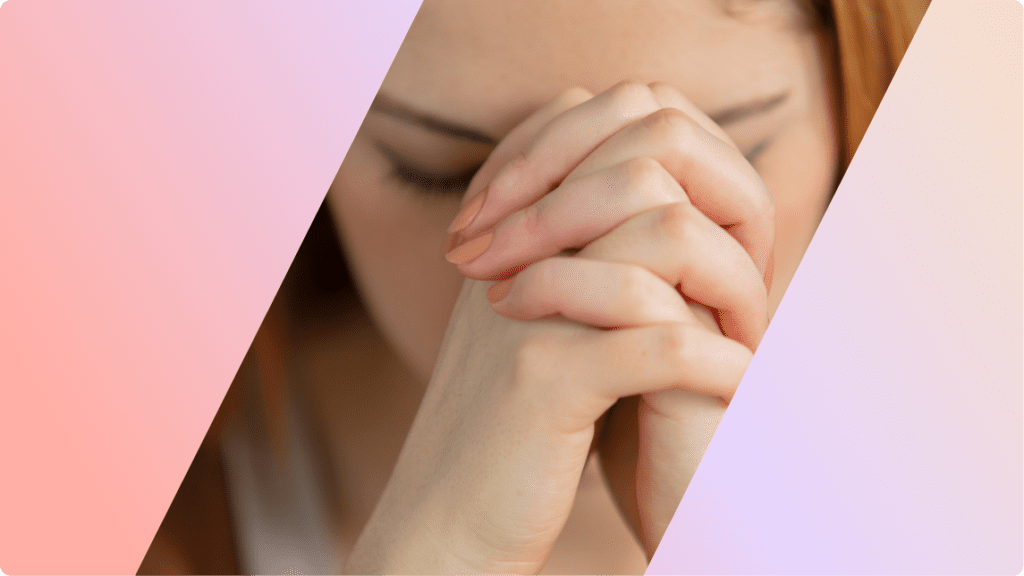Scrupulosity OCD, also called religious OCD, is a type of obsessive-compulsive disorder (OCD) where anxiety or fear about morality or faith dominate your thinking and actions. You might notice worries like:
- “What if I’ve sinned and didn’t realize it?”
- “Am I truly devoted–or just pretending?”
These fears can make even small choices feel like high-stakes decisions, as if a minor mistake could lead to spiritual failure, ethical wrongdoing, or angering a higher power.
But it’s important to remember: these intrusive thoughts are not a reflection of your faith or character—they’re symptoms of OCD.
In this article, we’ll break down what scrupulosity OCD looks like, how it shows up across different belief systems, and how effective treatment can help you reclaim your peace and spiritual connection.
What is scrupulosity OCD?
Scrupulosity is a form of OCD in which a person becomes consumed with a sense of moral or religious “rightness.” They may fear that they’ve sinned, violated their ethics, or offended a higher power, even when there’s no real evidence for it. These intrusive thoughts–or obsessions–and feelings of guilt can lead to compulsions aimed at easing their anxiety.
Scrupulosity can affect people from all belief systems, including both religious and secular backgrounds.
| Common Obsessions | Common Compulsions |
| “What if I sinned and didn’t realize it?” | Repeatedly confessing to religious leaders, loved ones, or even strangers. |
| “Did I offend God by thinking that?” | Excessive prayer or ritualizing to “make it right.” |
| “What if I’m secretly a bad person?” | Seeking reassurance that you’re still a good person or forgiven. |
| “What if I lose control and hurt someone morally?” | Mentally reviewing your day to make sure you didn’t sin or offend anyone. |
| “What if I made a promise to God and forgot to keep it?” | Re-reading or repeating religious texts or prayers to fulfill obligations. |
Is it faith or OCD?
It can be challenging to distinguish between genuine spiritual practice and scrupulosity. Here’s a helpful way to think about it:
| Genuine faith practice | Scrupulosity OCD |
| Brings comfort or meaning | Causes anxiety or dread |
| Aligned with your values | Feels like a burden or compulsion |
| Flexible and forgiving | Rigid, repetitive, and driven by fear |
| Done out of love or reflection | Done to neutralize a “bad” feeling or thought |
If your rituals feel more like a trap than a choice, OCD may be the culprit.
How scrupulosity shows up in different belief systems
Religious OCD can appear differently depending on your spiritual or ethical framework:
- Christians may fear taking the Lord’s name in vain or not praying “correctly.”
- Muslims may experience waswasa—excessive doubts during ablution or prayer.
- Jews may fixate on following halacha (Jewish law) perfectly.
- Hindus may worry about performing puja incorrectly.
- Atheists/agnostics may obsess over being immoral or unethical, even without a religious framework.
While the specific content of obsessions tends to mirror your beliefs, the underlying cycle of intrusive thoughts and compulsive behaviors follows the same OCD pattern.
How is Scrupulosity OCD treated?
Exposure and response prevention (ERP) therapy is the most effective, evidence-based treatment for OCD, including scrupulosity. ERP is a specialized form of cognitive behavioral therapy (CBT) proven to be effective for OCD. General CBT, if not tailored for OCD, can sometimes be unhelpful or even worsen symptoms.
ERP works by:
- Gradually exposing you to triggering thoughts or situations in a supported, structured way.
- Preventing the compulsive response, such as repeated confession or excessive praying.
Over time, ERP helps you tolerate uncertainty, reduce anxiety in response to triggers, and feel more confident in handling distressing thoughts.
Examples of ERP exposures for scrupulosity OCD
- Reading a prayer once without re-reading it “perfectly.”
- Sitting with the thought, “Maybe I offended God?” without confessing.
- Resisting the urge to mentally replay a conversation to make sure you didn’t lie or say something sinful.
ERP does not ask you to abandon your faith. It helps you reconnect with your values in a more peaceful and flexible way.
Find the right OCD therapist for you
All our therapists are licensed and trained in exposure and response prevention therapy (ERP), the gold standard treatment for OCD.
When should I seek help?
It’s best to speak with a mental healthcare provider if:
- You experience overwhelming distress over religious or moral thoughts.
- You feel like you’re never doing “enough” to be good or forgiven.
- You spend hours a day on rituals or avoidance.
- You let fear – not faith – drive your spiritual practices.
Working with an OCD specialist can help you navigate your beliefs without challenging your values, and teach you tools like ERP to feel more at peace.
Bottom line
Religious OCD, or scrupulosity OCD, can make your faith or moral code feel like a source of fear instead of comfort. But these thoughts and behaviors are not a reflection of your true beliefs–they are a treatable mental health condition. With ERP, you can break free from the cycle of intrusive doubts and compulsive rituals and reconnect with what matters most to you.
Help is available. Healing is possible.
Key takeaways
- Scrupulosity is a subtype of OCD focused on morality or religion.
- It involves distressing obsessions and compulsions like excessive praying, confessing, or avoidance.
- Exposure and response prevention (ERP) therapy is the most effective treatment for scrupulosity and all forms of OCD.
- With the proper treatment, you can break free from fear-driven rituals and reconnect with a more peaceful faith or ethical life.

